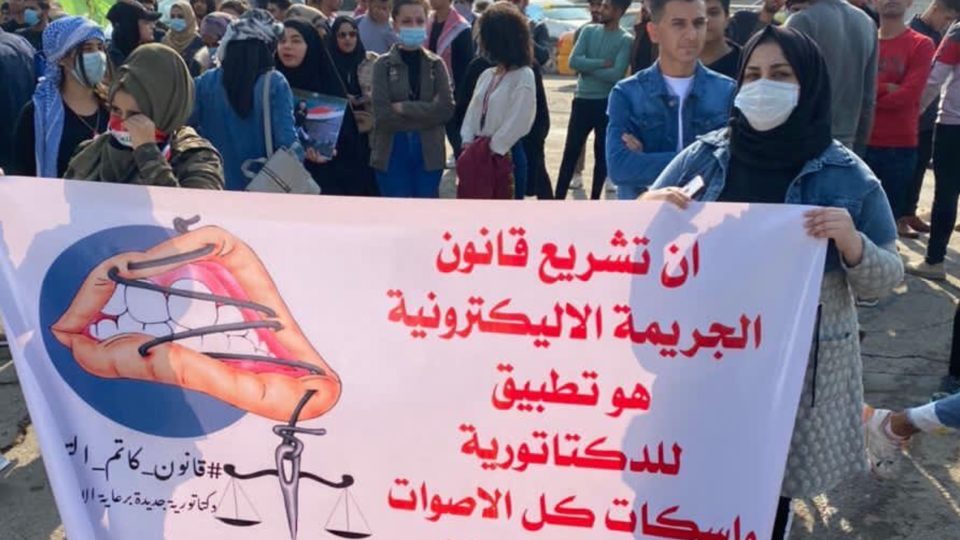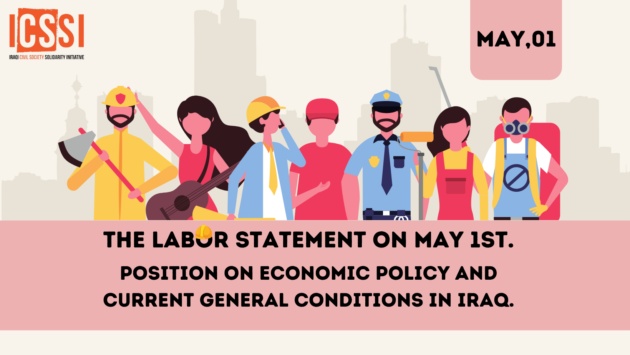Parliament Moves to Pass a “Cybercrimes Law” Protesters March Denouncing the “Law to Silence Expression”
After failing to pass a cybercrimes law during the governments of al-Maliki, al-Abadi and Abdul-Mahdi, the Iraqi parliament is trying yet again and is ready to vote. Critics consider it an attempt to deny freedoms, silence journalists and dissidents, and exempt politicians from criticism and accountability. Supporters say it is necessary to ensure national security and that it will also protect against financial fraud and intellectual property violations. Members of the parliament’s “security and defense committee” reported that the committee has finished discussing the law of “cybercrimes” and now intends to change its name to the “law of electronic crimes”, since it will address issues related to the internet, mobile phones, social networking sites, and electronic devices.
Activists and journalists, however, are deeply concerned about this law and say its goal is not to protect citizens. They stress that the law specifically targets social media sites, which are considered a vital platform for protesters, journalists and opponents of the government. Most striking is that the new law does not include clear and specific definitions of the crimes it would punish people for, although it does say punishment will require the confirmation of a special judge to combat cybercrimes.
The Iraqi political writer, Basil Hussein believes that “the political class in Iraq is thinking about a series of laws to protect itself from criticism or accountability”. In a commentary on the law, he wrote, “Members of the political class number not more than 500 individuals, compared with the Iraqi population, which is 38 million. We understand this proposed law ignores the interests of the citizens…and focuses on protecting the interests of a political minority that has long been accused of various kinds of corruption, the squandering of resources, and other absurd conflicts
Human rights organizations warn that the law includes dangerous provisions that could deny freedom of expression and the right to dissent, by granting government authorities wide powers to silence all criticism of the government. The law also gives government authorities the right to force journalists and citizens to disclose information and data; punishment includes jail and a large fine for those who refuse.
Skyline International, a human rights organization based in Stockholm, published a statement on November 25th saying that, “It is following with concern the readiness of the Iraqi parliament to present the ‘information crimes law’ to a vote in the fear that it will be used later to restrict freedoms guaranteed by the country’s constitution”. The effort to approve the law in Iraq comes at a time when government respect for and defense of public freedoms is deteriorating. There have been government campaigns of intimidation and harassment, and multiple arrests of and attacks on journalists and others exercising their right to freedom of expression. The intensity of the crackdowns has risen since the outbreak of widespread popular protest in October 2019. Iraqi authorities ordered eight television and four radio stations closed for several months, for alleged violations of media licensing rules, and at least three news agencies’ offices were raided and damaged.
Skyline International argued that Iraqi authorities should revise all laws to bring them into compliance with international human rights standards and remove all unclear provisions concerning offenses and incitement rather than passing a new law that raises additional concerns about the extent to which freedom of expression is guaranteed and protected. Skyline urged community discussion of the new law before it is brought to a vote, to ensure that it is not used to restrict the freedoms of Iraqis or to silence them.
Standing up for their rights, a number of activists demonstrated in Baghdad, on November 23, denouncing the danger of passing the new law, which they described as dangerous legislation. Their protest march was launched under the slogan “Law to Silence Expression”, indicating their outrage that parliamentarians seek to pass a law to restrict or deny freedom of expression.




